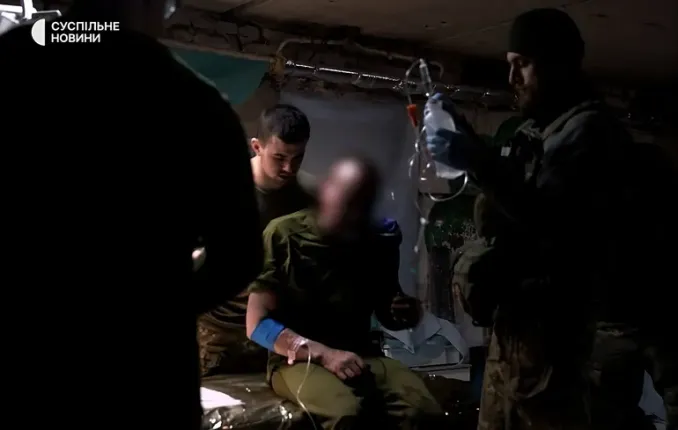Ukraine Urgently Needs Opioid Ban as Wounded Soldiers Face Concern

There is growing concern in the country over the uncontrolled, widespread use of the powerful opioid painkiller nalbuphine, which military doctors and experts say is causing addiction among servicemen and making it harder for them to recover from injuries. Medical experts are calling on the Ministry of Health to immediately add the drug to the list of controlled substances to restrict its free circulation in pharmacy chains, especially in areas near the front line, where access to medication is particularly critical. This was reported on her official Facebook page by Oksana Korchynska, a public figure and volunteer who has repeatedly raised this issue. According to her, medical workers, in particular the heads of medical supplies of military brigades and representatives of the Department of Health of the Ministry of Defense, appealed to the Ministry of Health with demands to either ban the sale of nalbuphine in pharmacy chains, or to legally equate it with narcotic drugs in accordance with the Resolution of the Cabinet of Ministers of Ukraine No. 770. According to Korchynska, the mass use of the drug outside medical protocols leads to the rapid development of addiction in the military, creating an additional danger to their health and safety. According to the community of volunteers and doctors, in 2024, more than 2.8 million packages of nalbuphine were sold in Ukraine, which made it the fourth most sold medicine in the country. At the same time, the electronic prescription system recorded only about five thousand prescriptions, of which less than 800 were actually paid — less than 0.04% of the total sales. This indicates its massive use without proper registration and control. The volunteer adds that the drug falls into the hands of soldiers in front-line areas without proper documentation and accounting, which further complicates the situation. Korchynska notes that in some cases, doctors prescribe nalbuphine instead of more modern and effective drugs, citing a lack of funding and the need to save money. This directly leads to the fact that after treatment, many soldiers return home with an already formed serious addiction. According to her, withdrawal symptoms after nalbuphine — aches, insomnia, anxiety, panic attacks — resemble manifestations of heroin addiction. Soldiers compare the state of "withdrawal" with heroin addiction, but for fear of losing the trust of the command and a lowered status, they often remain silent and are in no hurry to talk about the problem. Of particular concern is the fact that nalbuphine is still not included in the list of controlled substances in Ukraine, so pharmacies are not required to adhere to strict rules for accounting, storage and dispensing of this drug. This creates a risk of its unauthorized use and distribution outside of regulation, which is especially dangerous in military conditions. Doctors and activists are demanding the urgent inclusion of nalbuphine in the list of controlled substances and the establishment of strict state control over its circulation. Against the background of this problem, the question of the availability of proper pain treatment in Ukraine is acute. There are almost no qualified palliative care specialists in the country, and many patients are forced to endure pain due to the lack of modern, effective and safe painkillers. Discussions are underway to reform the pain management system, as the mass sale and use of prohibited or imperfect drugs only complicates the situation. As experts and doctors note, nalbuphine is a cheap but dangerous opioid that is often called the "opioid for the poor" - it is cheaper than other analogues, but it causes severe mental and physical dependence. There are known cases when soldiers who were treated with this drug could not get rid of the addiction, and the withdrawal symptoms - aches, insomnia, anxiety - resemble those of heroin. And although nalbuphine was previously widely used in the military and was part of first-aid kits, its use now raises many questions about safety and feasibility. At the same time, experts and activists emphasize that modern medicine offers much safer and more convenient alternatives - fentanyl patches, morphine tablets and other drugs that are included in international pain relief protocols and have scientifically proven effectiveness. The use of nalbuphine under current conditions is risky, as it loses its compliance with international standards and creates additional danger for combat and medical discipline. Leading public activists and doctors call for a quick response from the state - including nalbuphine on the lists of controlled substances, strict control over its circulation and the search for alternative, safer means of pain relief. After all, the country should focus on creating a system of high-quality palliative care that is capable not only of treating, but also of preventing the development of addiction and maintaining the combat capability of the military. Pain in the country, which is often replaced by simply enduring, is not only physical pain, but also a symptom of the danger and systemic inexpediency of modern medicine. Ukraine must find ways to help its patients, solve the problem of uncontrolled use of narcotic drugs and build a system that is based not only on quick pain relief, but also on caring for the long-term health and safety of everyone who is fighting and who needs support. In more detail about this problem, its causes and possible solutions, Yulia Melnychuk and Andriy Strokan, a doctor from the Ukraine Without Pain project, tell us in an interview.

